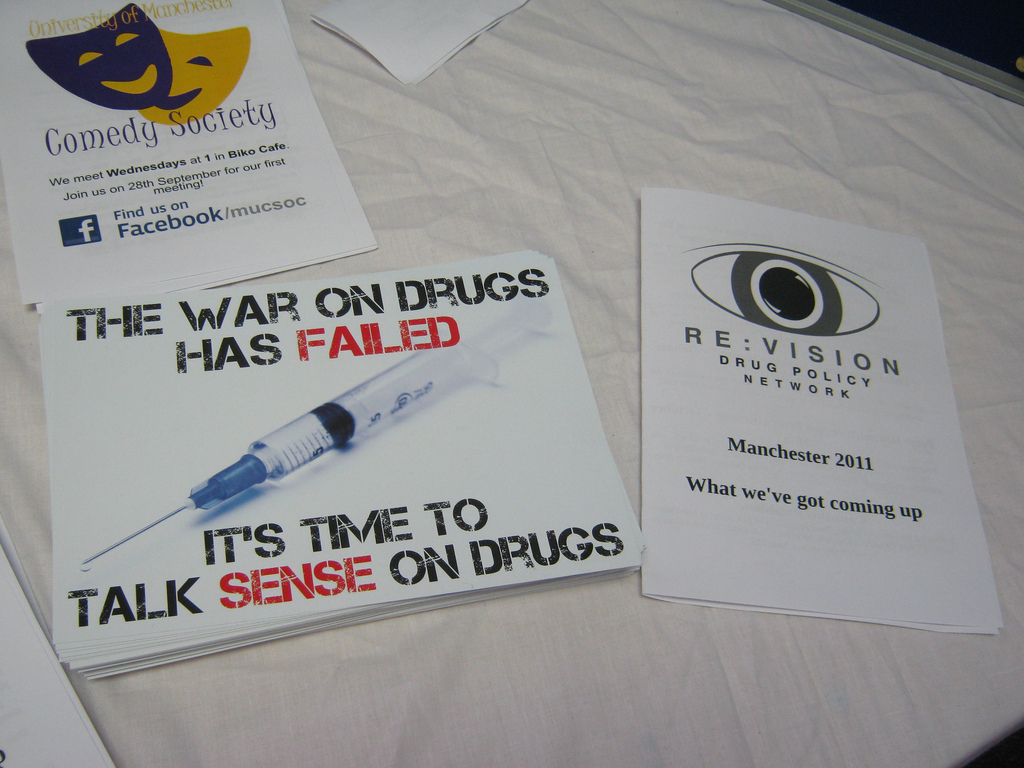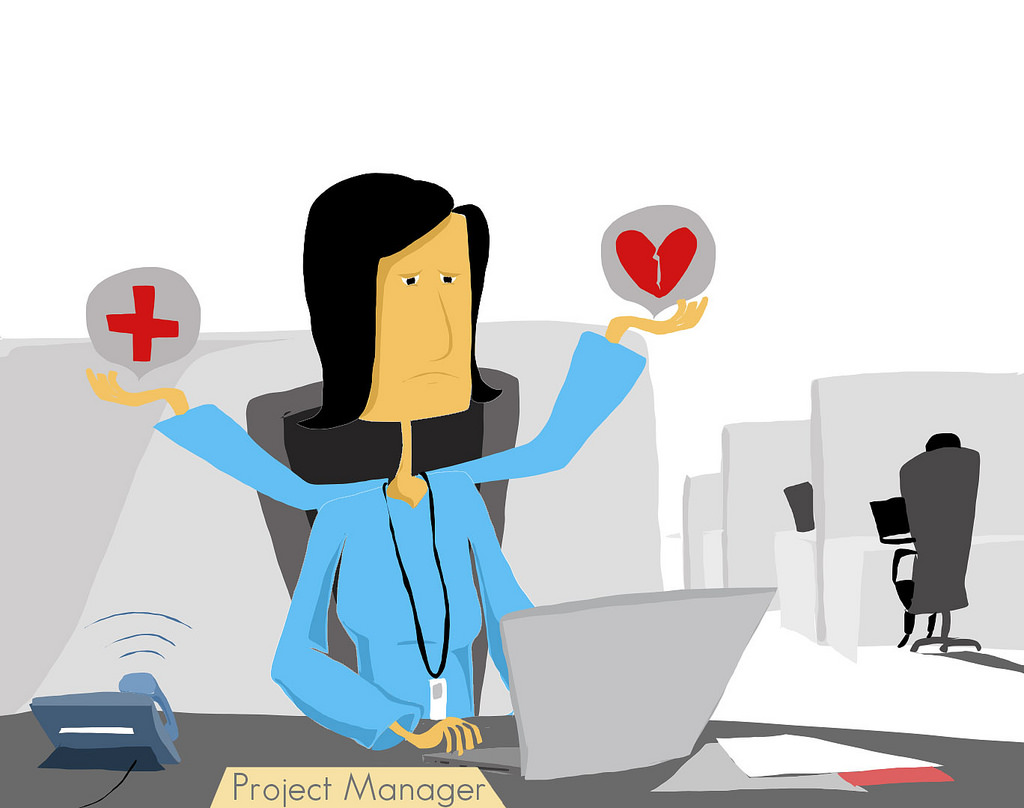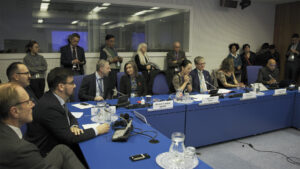Seeing the reluctance of world leaders, will civil society finally stand up for itself and say enough with the human rights abuses and suffering caused by the war on drugs? Read the opinion of Jerry Dorey, our volunteer. If you have an opinion on this subject, please send it to us!
I've always found it faintly amusing that we talk about 'political leaders', just as I find it amusing that the media often refers to the 'international community', when they don't actually mean the 'community' at all, just the politicians. In my experience of them, one thing politicians definitely hardly ever do, is lead. For the most part, with a few notable exceptions such as Ruth Dreifuss, politicians tend to do what the generals do on a muddy, foggy battlefield – finding their way around by gravitating towards the biggest crowds, and trying to avoid the dangerous places where there are a lot of bloody corpses. So I might call what they do, 'blindly groping', and I'd certainly call it following – but not leading.
Which brings us to UNGASS 2016. In a recent article, my friend and colleague Péter Sárosi sought to tone down expectations of this forthcoming jamboree, as he spoke of the bureaucratic inertia of the UN system, its inability to deal with change. And yet, there are two things opposing that inertia: One is the fact that people – ordinary people, whose highest ambition is to be allowed to live in peace, without persecution, and to help others do likewise – have been hoping for reform, in the drugs policy sphere, for an immensely long time – at least forty years, in my own case, and I'm sure there are people who've been in the fight longer than I have. That's a huge weight of pent-up human hope – but previous experience suggests that, on its own, it's not quite the irresistible force that's needed to shift the immovable object.
 The other major element in the equation is that the organised activists – groups such as INPUD, Transform, the DPA, the Global Commission on Drug Policy and so many others – are now at last beginning to receive support from key UN agencies. Over the past few months, agencies such as UNAIDS, WHO, UNDP, and even (kicking and screaming, but eventually getting there) UNODC, have at last come out of the closet, either separately or huddled together in a group, and dared to say, publicly, that torturing and murdering millions of people for growing the wrong crops, being the wrong colour, and having the wrong body-contents, is perhaps not wholly compliant with best practice in terms of freedom and human rights.
The other major element in the equation is that the organised activists – groups such as INPUD, Transform, the DPA, the Global Commission on Drug Policy and so many others – are now at last beginning to receive support from key UN agencies. Over the past few months, agencies such as UNAIDS, WHO, UNDP, and even (kicking and screaming, but eventually getting there) UNODC, have at last come out of the closet, either separately or huddled together in a group, and dared to say, publicly, that torturing and murdering millions of people for growing the wrong crops, being the wrong colour, and having the wrong body-contents, is perhaps not wholly compliant with best practice in terms of freedom and human rights.
Because you can't have it both ways: If you're one of those people who obsess about telling other people how to run their lives – if you're someone who believes that people whose substance-of-choice differs from your own should be punished and persecuted – then there isn't a kind and gentle way of achieving that, just as there isn't a kind and gentle way to carry out any other form of rape. Prohibition may be popular in those circles, but there's no getting around the fact that attempting to control the contents of other people's bodies and minds is an inherently immoral, wicked enterprise, which can only ever be pursued by bad methods and lead to bad results.
More and more people are becoming aware of that simple truth – but the politicians are still, for the moment, following the (dwindling) crowd they or their predecessors latched onto forty or more years ago. As the tragic decades have rolled past, they've invested so much in this strategy, that they simply don't dare acknowledge that anything has changed, or that the strategy never had the faintest chance of success (unless, of course, its real purpose was to promote tyranny and corruption). So, instead of going indoors and putting some clothes on, the emperor employs someone to trot alongside him and make enthusiastic comments about his dress-sense.
The work of the latest in a long line of such obsequious servants can be seen in the EU's 'Common Position Paper', released in advance of UNGASS. Studiously ignoring the representations of civil society, this document is an uneasy compromise between the need to recognise that UNGASS 2016 is being held, brought forward from the scheduled 2019 date, for a reason – and the need to please all the EU member governments, however repressive they may be. The result is a document which seems to have arrived out of some kind of parallel universe – a world in which UN agencies, civil society, and vocal substance-users and defenders of freedom don't exist, a world in which mass incarceration, institutional racism, well-funded terrorism, and wholesale corruption of the financial, political, and judicial systems have all been effective tools in reducing the supply and use of 'drugs'.
The Common Position Paper sets out its stall right from the beginning, with a statement that any outcome from UNGASS must be based on the three UN Drug Conventions (in combination with the Universal Declaration of Human Rights – but more about that in a moment.) According to the authors, and the lowest common denominator of repressive governments that they represent, Prohibition is a 'given', and the Drug Conventions are Holy Writ. Everything that happens at UNGASS must be based on the principle that people who use an arbitrary set of legal drugs have a right (indeed, have a duty) to persecute people who use another arbitrary set of illegal drugs. The writers never, of course, explain why this should be – but of course, Prohibitionists have never troubled themselves to explain why – with the notable exception of Harry Anslinger, a hundred years ago, who made it admirably clear that as far as he was concerned, the purpose of Prohibition was to crush the 'inferior races'.
So – having failed to recognise that neither drug supply reduction, nor drug demand reduction, are legitimate activities of government – having further failed to acknowledge that a century of such attempts has achieved nothing except bloodshed and misery – and having shut their eyes and ears to civil society and international agencies pointing out these obvious truths – the writers of the EU report have set themselves on a course which can only produce more of the same. The report is a case-study in “Laa-laa I can't hear you”.
They claim to espouse a 'public health approach', while ignoring the fact that such an approach can only be relevant in relation to the small proportion of drug users who experience health problems. For the rest, a public health approach, designed to restrict their sovereignty over their own bodies, is just another form of stigmatisation. In case you should doubt the real intentions of this 'public health approach', the paper supports the concept of mandatory, coercive 'treatment', in 'exceptional circumstances' – circumstances which will, of course, be decided by local politicians. Mission creep, anyone?
 They claim that the three UN Drug Control Conventions can be made to work in harness with the fatally-flawed Universal Declaration on Human Rights (flawed, because, like the ECHR, it incorporates a loophole to allow governments to persecute their citizens, just as long as they say that their goal is national security or 'national morality'.) Even if one ignores the fact that the Conventions have been operating alongside the Universal Declaration for decades, with the horrific results we see all around us – and even if the three Conventions could be considered compatible with the letter of the UDoHR – they are certainly incompatible with its spirit.
They claim that the three UN Drug Control Conventions can be made to work in harness with the fatally-flawed Universal Declaration on Human Rights (flawed, because, like the ECHR, it incorporates a loophole to allow governments to persecute their citizens, just as long as they say that their goal is national security or 'national morality'.) Even if one ignores the fact that the Conventions have been operating alongside the Universal Declaration for decades, with the horrific results we see all around us – and even if the three Conventions could be considered compatible with the letter of the UDoHR – they are certainly incompatible with its spirit.
The writers speak (as they had to, for form's sake) of an enhanced rôle for civil society – but the words "especially in the field of drug demand reduction" should ring a clear warning bell: Civil society will be allowed a voice – but only those sections of civil society which support an enforced abstinence approach, as dictated by the Conventions, will be listened to.
The document doesn't display any radical new thinking, but that was never its intention. Its aim, transparently, was to pay lip-service to the idea of holding an international conference to fundamentally review the goals and achievements of the Drug War, while upsetting as few politicians as possible. So it calls, for instance, for 'alternative punishments' for drug users, without stating what such alternatives might be; indications from the US, however, suggest that the corporations know: Private prison operators are already diversifying into the areas of enforced therapy and managing house arrest.
In the meantime, the Common Position Paper merely represents an attempt to replace one unachievable aim – universal control over the ingestion of substances which lie outside a favoured list – with two other equally unachievable aims: Medicalising all ingestion of substances outside that list; and reconciling the principles of fundamental human rights with the desire to deprive people of those same rights. On the way, the authors restate the current (completely unsatisfactory) UN positions in terms of pain-relief and sustainability, and advocate more international police co-operation, more surveillance, and a scaling-up of the fight against suppliers – i.e. more Drug War – together with a few token words about women, children, and the death penalty. If this document really represents what UNGASS 2016 holds in store, then its failure can safely be predicted in advance.
And yet, and yet… Civil society will be attending UNGASS 2016 in great numbers. The key UN agencies will be there – and they're not likely to change their statements, just to please the dictators. Millions of others, unable to be there in person, will be following events from around the globe, and – having waited already for so many years – will be enraged if the conference fails to produce substantial reform. These are people who, working together, have enough weight to topple the Berlin Wall of Prohibition. It all depends on whether the real international community stands up.
Jerry Dorey, volunteer native editor for Drugreporter




